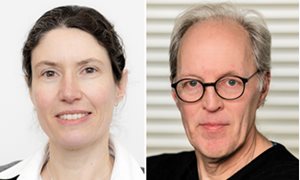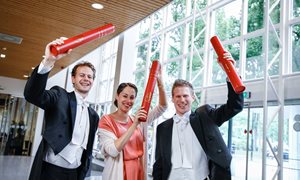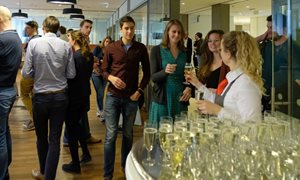 Carl Figdor, theme Cancer development and immune defense and Mihai Netea, theme Infectious diseases and global health, have each received an ERC Advanced Grant. The amount varies per grant, but is approximately 2.5 million euros. They can use this funding to continue their research for the next five years. In total, there are 21 ERC Advanced Grants granted to researchers of Dutch universities this year.
Carl Figdor, theme Cancer development and immune defense and Mihai Netea, theme Infectious diseases and global health, have each received an ERC Advanced Grant. The amount varies per grant, but is approximately 2.5 million euros. They can use this funding to continue their research for the next five years. In total, there are 21 ERC Advanced Grants granted to researchers of Dutch universities this year.
In the ‘ARTimmune’ project, Carl Figdor focuses on the intriguing, novel idea of creating injectable synthetic lymph nodes to attack tumours more directly. His idea may have important implications for clinics. Currently, many cancer patients are failing to respond to immune therapy and new strategies are desperately needed. ARTimmune builds on the success and increasing popularity of immunotherapy in oncology, and seeks to overcome the key limitations of current treatments, such as serious side effects. Current treatments, such as CAR T-cell therapy and checkpoint inhibitors, can result in severe toxicity to normal tissues. Figdor wants to investigate a new approach in which the use of local immunotherapy reduces both toxicity and immune suppression by the tumour. ARTimmune is a direct result of the Institute of Chemical Immunology’s gravity programme, with Figdor being one of the initiators and in which chemists work closely together with immunologists.
Mihai Netea – improving vaccinations for the elderly
Mihai Netea seeks to understand how our body recognises all those pathogens and fights them effectively. Our immune system consists of an ‘innate’ and a ‘adaptive’ component. We receive this innate component at birth. The adaptive part can ‘learn’ from past infections and develops during our lifetime through direct contact with bacteria, fungi and viruses. The adaptive immune system component stores these contact situations in its immunological memory. Thanks to that memory, the immune system can strike quickly and effectively when a new infection of an already known pathogen is detected. It has long been thought that this memory is an exclusive feature of the learned defences. However, research by Mihai Netea and colleagues shows that this is not the case. The innate system also has a memory, albeit a non-specific one. Something they call ‘trained immunity’. They also discovered that the BCG vaccine against tuberculosis can stimulate the innate immune system’s memory. They demonstrated that the innate immune system responds better to all kinds of other infections after a BCG vaccination has been administered. Now Netea wants to investigate whether the vaccine can be used to boost the immune system of the elderly. Netea and his colleagues hope to clarify the role of different immune cells in trained immunity in order to ultimately determine whether the BCG vaccination can be useful for specific target groups with a weakened immune system.
More information about ERC Advanced grants at Radboud University you can find here.
-
Want to know more about these subjects? Click on the buttons below for more news.
Related news items

ZonMw Open Competition Grant for Annemiek van Spriel and Piet Gros
15 June 2021 Annemiek van Spriel, theme cancer development and immune defense, together with Piet Gros, Dept. of Chemistry, Utrecht University obtained a ZonMw Open Competition Grant to investigate IL-6 receptor structure and signalling in tumor cells. read more
HFSP Grant for Johannes Textor
30 March 2020 Johannes Textor, theme Cancer development and immune defense, has been awarded a program grant of 1 million US dollars by The Human Frontier Science Program (HFSP) to investigate how T cells navigate extremely dense environments using experiments, modeling and methods from pedestrian dynamics. read more
RIMLS PhD grants awarded to eight RIMLS (j)PI's
12 September 2019 Recently, RIMLS held an internal call for Radboudumc junior researcher (PhD) positions. Congratulations for all the awardees and all the best in conducting the research projects. read more
Three VIDI grants for RIMLS researchers
24 May 2019 Matthijs Jore, Daniele Tauriello and Johannes Textor are each to receive up to 800,000 euros to develop an innovative research theme and to build up their own research group. NWO is awarding the Vidi grant as part of the Innovational Research Incentives Scheme. read more
RIMLS awards festival Twelve winners
16 January 2019 In 5 categories RIMLS young researchers received an award and bonus during the New Year's drinks. See all photo's. read more
